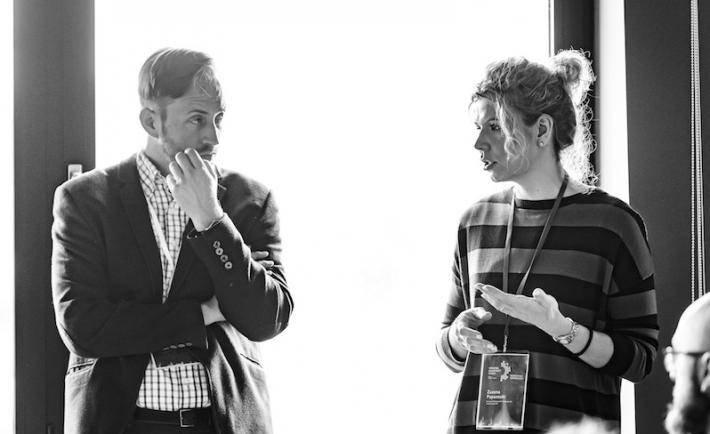I grew up in the capital of what is now Slovakia, right on the river that borders Austria. I remember being near this very river, peering over to see what was on the other side. A barbed-wire fence sat between the two countries, a literal and figurative separation between democracy and the “Iron Curtain” that laid itself across Central and Eastern Europe at the time. The presence of the fence is something that I have since held in my mind; it was and continues to be a part of my daily reality - something continuously propelling me toward democracy.
I always considered, and still to some extent, consider Czechoslovakia my home. After 1989, when groups in Czechoslovakia began talking about splitting into two countries, I remember feeling unsettled. Once the separation of of Czechoslovakia became final, the concept of being a part of the European Union was strong. I wanted, and Slovakians wanted, to be part of a democratic world. At the time I was studying law and was concerned about the future of my country, as I continued to have the vision of the barbed-wire fence with dogs stalking past in my mind. Because of this I became part of a human rights club that held the belief that the younger generation would be the change. We visited more than a hundred schools with the intent to engage the youth, knowing that with youth involvement the election results could be changed and the corrupt regime could be overturned, beginning the long transition into a democracy. It was then I got acquainted with NDI.
"I have a theory that certain people are born activists."
In 1998 NDI established election and media monitoring in Slovakia. This came at a time when Slovakia was headed by a very - I can now comfortably say - corrupt prime minister. I was a founding member of the first domestic monitoring organization called CivicEye. Over the course of three months we recruited almost 2,000 observers, who monitored the parliamentary elections in Slovakia. As a result, Slovakia managed to change its regime, the more democratic government took over and we were able to join the European Union. This was an incredible feat.
I have a theory that certain people are born activists. In my case I was active since primary school, participating in demonstrations and writing letters to President Havel, the former leader of Czechoslovakia. In this regard, NDI was a natural partner for me, where I was able to work on incredibly important issues: Not only political parties and elections, but civic society, and engaging women and youth. I have since worked with NDI for 13 years, in my own country, and others in the Western Balkans and Central Europe. I currently head the NDI Poland office and manage NDI's Western Balkan Legislative Strengthening program, a multi-year effort to increase collaboration between the parliaments of Western and Central Europe and the Western Balkans to foster cross-border and regional exchanges from the Institute's office in Bratislava, Slovakia. What I went through in my youth in Czechoslovakia, along with my experience with NDI, has wholly shaped my work in the Western Balkans, and allowed me to understand their position first hand. I could empathize with the challenges they were facing since I, and my country, went through a similar process.
For the first time, current voters in the Czech Republic and Slovakia were born in functioning democracies, and to many of them communism seems like an ancient past. Living and voting in a democracy is a daily reality for these first-time voters...a stark contrast to my own. It reminds me that a democracy, and the freedoms enjoyed with it, is something we must continue to fight for each and every day.

